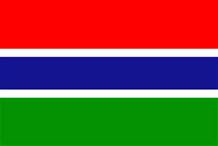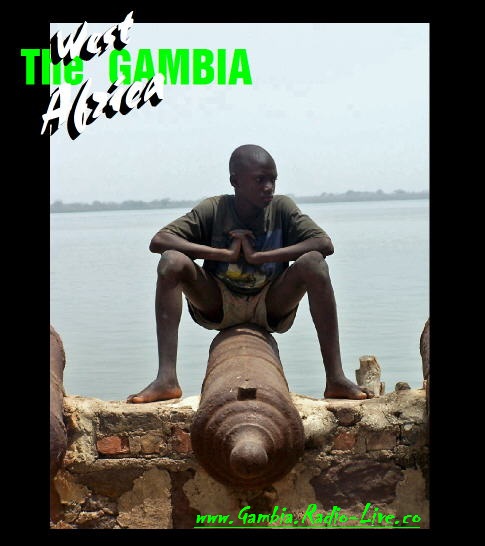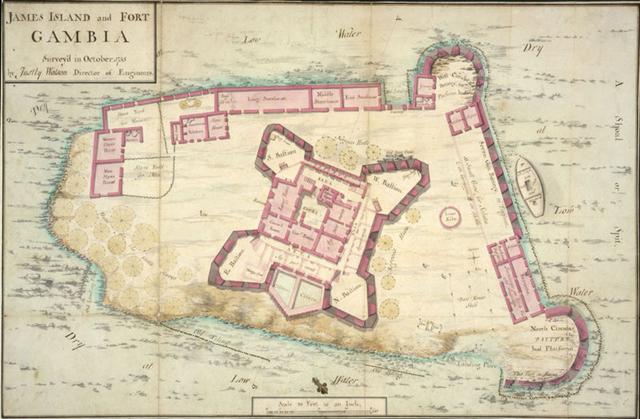Connections can be a bit slow or erratic (depending on network traffic), and may not always work (the audio server may be offline or serving the maximum number of connections). A link which is down may return minutes, days or weeks later.
Connections can be a bit slow or erratic (depending on network traffic), and may not always work (the audio server may be offline or serving the maximum number of connections). A link which is down may return minutes, days or weeks later.

Advertisement



A map of James
Island and Fort Gambia
During the late-17th century and throughout the 18th century,
the British Empire and the French Empire struggled continually for
political and commercial supremacy in the regions of the Senegal
River and the Gambia River. The British Empire occupied the Gambia
when an expedition led by Augustus Keppel landed there—following
the Capture of Senegal in 1758. The 1783 First Treaty of Versailles
gave Great Britain possession of the Gambia River, but the French
retained a tiny enclave at Albreda on the river's north bank. This
was finally ceded to the United Kingdom in 1856.
Louis Farrakhan
On Jews Running The Slave Trade
QUOTE "
“What has remained a secret and not [sic] spoken of is the Jewish
involvement in the undoing of Black people and the slave trade and
the owners of ships and the selling and dehumanizing of Black
people.”
Interview on the Michael Eric Dyson show 8/23/10
"
UNQUOTE
The ADL, a very hostile source quote Louis without comment but then
the Nation of Islam is big enough to sue loud mouthed chancers for
libel
Advertisement
The Gambia
(officially the Republic of the Gambia), is a
country in West Africa. It is surrounded by Senegal, apart from a
short strip of Atlantic coastline at its western end. It is the
smallest country on mainland Africa.
The country is situated either side of the Gambia River, the
nation's namesake, which flows through the country's centre and
empties into the Atlantic Ocean. Its area is 11,295 km² with an
estimated population of 1.7 million.
On 18 February 1965, the Gambia gained independence from the United
Kingdom and joined the Commonwealth of Nations. Banjul is the
Gambian capital, but the largest cities are Serekunda and
Brikama.
The Gambia shares historical roots with many other West African
nations in the slave trade, which was the key factor in the placing
and keeping of a colony on the Gambia River, first by the
Portuguese and later by the British. Since gaining independence in
1965, the Gambia has enjoyed relative political stability, with the
exception of a brief period of military rule in 1994.
Thanks to the fertile land of the country, the economy is dominated
by farming, fishing, and tourism. But, about a third of the
population lives far below the international poverty line of
US$1.25 a day.
Arab traders provided the Gambia's first written accounts in the
9th and 10th centuries.
Black Slaves -
Traded By Jews
QUOTE "
An accurate accounting of the history of Blacks and Jews from the
Columbian era to the Civil War, including the extensive record of
Jewish slave trading in the western hemisphere. 334 pages - 1,275
footnotes - More than 3,000 sources - Jewish journals,
encyclopaedias, newspapers & other publications - Jewish
scholars & rabbis - Court records - Shipping records - Jewish
wills - Runaway slave notices - Auction notices - Published sermons
- Census data - Slave bills of sale - Tax records Full Index -
Bibliography.
"
UNQUOTE
By the 11th century or the 12th century, the rulers of kingdoms
such as Takrur (a monarchy centred on the Senegal River just to the
north), ancient Ghana and Gao, had converted to Islam and had
appointed Muslims who were literate in the Arabic language as
courtiers.
At the beginning of the 14th century, most of what is today called
Gambia was part of the Mali Empire. The Portuguese reached this
area by sea in the mid-15th century, and they began to dominate
overseas trade.
In 1588, the claimant to the Portuguese throne, António, Prior of
Crato, sold exclusive trade rights on the Gambia River to English
merchants. Letters patent from Queen Elizabeth I confirmed the
grant. In 1618, King James I of England granted a charter to an
English company for trade with the Gambia and the Gold Coast (now
Ghana). Between 1651 and 1661 some parts of the Gambia were under
Courland's rule, and had been bought by Prince Jacob Kettler, who
was a Polish-Lithuanian vassal.
According to its
president Yahya Jammeh, the Gambia "is one of the
oldest and biggest countries in Africa that was reduced to a small
snake by the British government—[which] sold all our lands to the
French".
As many as three million slaves may have been taken from this
general region during the three centuries that the transatlantic
slave trade was operated. It is not known how many slaves were
taken by inter-tribal wars or Muslim traders before the
transatlantic slave trade began. Most of those taken were sold by
other Africans to Europeans; others were prisoners of inter-tribal
wars; some
taken were sold by other Africans to Europeans; others were
prisoners of inter-tribal wars; some were victims sold because of
unpaid debts; and others were simply victims of
kidnapping.
Traders initially sent slaves to Europe to work as servants
until the market for labour expanded in the West Indies and North
America in the 18th century. In 1807, the United Kingdom abolished
the slave trade throughout its Empire. It also tried,
unsuccessfully, to end the slave trade in the Gambia. Slave ships
intercepted by the Royal Navy in the Atlantic were also returned to
the Gambia, with Liberated Slaves released on MacCarthy Island far
up the Gambia River where they were expected to establish new
lives. The British established the military post of Bathurst (now
Banjul) in 1816. In the ensuing years, Banjul was at times under
the jurisdiction of the British Governor General in Sierra Leone.
In 1888, the Gambia became a separate colony.
An agreement with the French Republic in 1889 established the
present boundaries. The Gambia became a British Crown Colony called
British Gambia, divided for administrative purposes into the colony
(city of Banjul and the surrounding area) and the protectorate
(remainder of the territory). The Gambia received its own executive
and legislative councils in 1901, and it gradually progressed
toward self-government. Slavery was finally abolished in
1906.
During World War II, the entire Gambian army, 10 soldiers,[citation
needed] fought with the Allies of World War II.[citation needed]
Though these soldiers fought mostly in Burma, some died closer to
home and there is a Commonwealth War Graves Commission cemetery in
Fajara (close to Banjul). According to Jammeh, "when Germany was
about to defeat Britain, not only were Gambians conscripted and
forced to go and fight in Britain, but also..."
Banjul contained an airstrip for the U.S. Army Air Forces and a
port of call for Allied naval convoys. President of the United
States Franklin D. Roosevelt visited by air and stopped overnight
in Banjul en route to and from the Casablanca Conference (1943) in
Morocco, marking the first visit to the African continent by an
American President.
After World War II, the pace of constitutional reform increased.
Following general elections in 1962, the United Kingdom granted
full internal self-governance in the following year. The Gambia
achieved independence on 18 February 1965, as a constitutional
monarchy within the Commonwealth of Nations. Shortly thereafter,
the national government held a referendum proposing that an elected
president should replace the Gambian monarch (Queen Elizabeth II)
as the head of state. This referendum failed to receive the
two-thirds majority required to amend the constitution, but the
results won widespread attention abroad as testimony to the
Gambia's observance of secret balloting, honest elections, civil
rights, and liberties. On 24 April 1970, Gambia became a republic
within the Commonwealth, following a second referendum. Prime
Minister Sir Dawda Kairaba Jawara became the Head of State.
The Gambia was led by President Dawda Jawara, who was re-elected
five times. The relative stability of the Jawara era was shattered
first by an attempted coup in 1981. The coup was led by Kukoi Samba
Sanyang, who, on two occasions, had unsuccessfully sought election
to Parliament. After a week of violence which left several hundred
people dead, Jawara, in London when the attack began, appealed to
Senegal for help. Senegalese troops defeated the rebel force.
In the aftermath of this attempted coup, Senegal and Gambia signed
a Treaty of Confederation in 1982. The goal of the Senegambia
Confederation was to combine the armed forces of the two states and
to unify their economies and currencies. After just a short stretch
of years, Gambia permanently withdrew from this confederation in
1989.
Dr. David Duke exposes the Zionists role in the African and global slave trade.
In 1994, the Armed Forces Provisional Ruling Council (AFPRC) deposed the Jawara government and banned opposition political activity. Lieutenant Yahya A.J.J. Jammeh, chairman of the AFPRC, became head of state. The then 29-year-old dictator remains president to this day. The AFPRC announced a transition plan for return to democratic civilian government. The Provisional Independent Electoral Commission (PIEC) was established in 1996 to conduct national elections. The PIEC was transformed to the Independent Electoral Commission (IEC) in 1997 and became responsible for registration of voters and conduct of elections and referendums. In late 2001 and early 2002, the Gambia completed a full cycle of presidential, legislative, and local elections, which foreign observers deemed free, fair, and transparent, albeit with some shortcomings.
President Yahya Jammeh, who was elected to continue in the position he had assumed during the coup, took the oath of office again on 21 December 2001. Jammeh's Alliance for Patriotic Reorientation and Construction (APRC) maintained its strong majority in the National Assembly, particularly after the main opposition United Democratic Party (UDP) boycotted the legislative elections.
.........................
Advertisement
"If you hear disco and think of long haired pretty boys singing notes high enough to shatter crystal, you've got the wrong idea about what we're doing here.
Disco never really died. It went underground and morphed into
something much sillier."
- Mr. Disco
Latest Twitter News GAMBIA:
Please Visit Again!
More Gambian Live Radio Stations will follow soon!
More African Live Radio:
Sponsor Ads
Sources to the Text are: http://www.sunray22b.net/jews_and_slave_trading.htm / http://ironlight.wordpress.com/2010/06/09/the-major-jewish-role-in-the-slave-trade/ / http://en.wikipedia.org/wiki/Jews_and_the_slave_trade / http://en.wikipedia.org/wiki/The_Gambia /
© Gambia.Radio-Live.co 2012 - 2014
www.Radio-Live.co
Part of www.Radio-Live.co (see Terms/Conditions
& Privacy Policy)